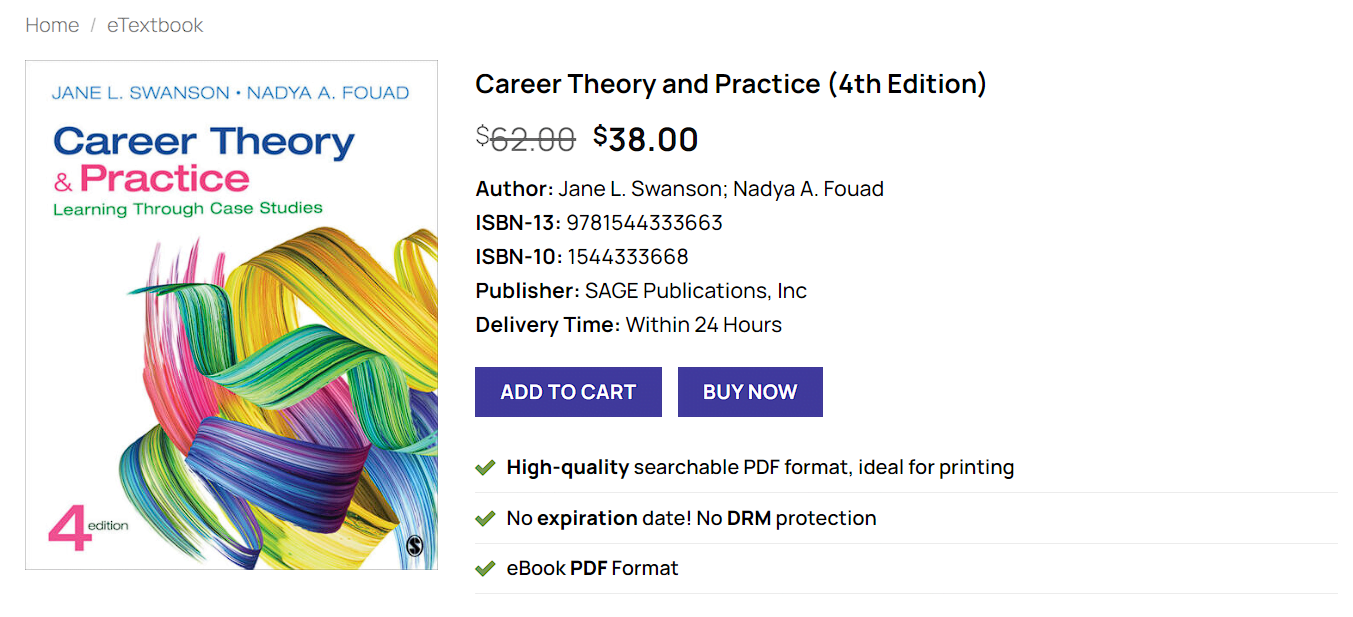Career Theory and Practice 4th Edition serves as a comprehensive guide in the ever-evolving field of career development. Aimed primarily at career counselors, educators, and students, this edition is designed to bridge the gap between theory and practical application. It highlights the latest advancements and trends in career theory, ensuring that readers are equipped with up-to-date knowledge and tools for effective career guidance.
Building on the foundation of its predecessors, this edition integrates recent research findings and contemporary trends. The authors, who are well-respected experts in the field, include Jane L. Swanson and Nadya A. Fouad. Both bring a wealth of experience and insight into the complex dynamics of career development. Their combined expertise lends credibility and depth to the content, making it an invaluable resource for those engaged in career counseling and development.
The book is meticulously structured to offer a logical progression from foundational theories to practical applications. It begins with a thorough examination of key career development theories, providing a solid theoretical framework. Subsequent chapters delve into career counseling techniques, offering practical strategies and tools that can be employed in various professional settings. The integration of theory into practice is a recurring theme, ensuring that readers are not only knowledgeable about theoretical concepts but also proficient in applying them.
Among the major topics covered are the principles of career development, the role of career counselors, and the impact of socio-economic factors on career choices. The book also explores the intersection of career theory with real-world practice, emphasizing the importance of adaptability and continuous learning in the field. By addressing these key areas, the fourth edition of Career Theory and Practice remains an essential resource for those committed to advancing their understanding and practice of career development.
“`
Key Concepts and Principles in Career Theory and Practice: 4th Edition
‘Career Theory and Practice: 4th Edition’ offers a comprehensive exploration of foundational theories essential for understanding career development and counseling. Central among these is Holland’s Theory of Vocational Personalities and Work Environments. This theory posits that individuals and work environments can be categorized into six types: Realistic, Investigative, Artistic, Social, Enterprising, and Conventional (RIASEC). Career counselors leverage this framework to align clients’ personalities with compatible work environments, enhancing job satisfaction and performance.
Another pivotal theory is Super’s Life-Span, Life-Space Theory, which emphasizes the evolving nature of career development. According to Super, individuals pass through distinct career stages—from growth and exploration to establishment, maintenance, and disengagement. This theory also highlights the concept of life roles and the importance of career adaptability. Career counselors use this model to guide clients through transitions, ensuring their career paths align with their life stages and personal growth.
The Social Cognitive Career Theory (SCCT) integrates cognitive and motivational aspects, focusing on self-efficacy, outcome expectations, and personal goals. SCCT underscores the significance of believing in one’s abilities and setting realistic career goals. Counselors applying SCCT help clients build confidence in their skills, navigate obstacles, and develop actionable career plans.
Beyond these foundational theories, ‘Career Theory and Practice: 4th Edition’ addresses contemporary approaches and emerging trends. For instance, the integration of technology in career services has revolutionized the field, offering tools like virtual career fairs, online assessments, and digital counseling platforms. Such innovations enhance accessibility and provide clients with more resources to explore career options.
Moreover, the importance of cultural competence in career counseling is increasingly recognized. As the workforce becomes more diverse, counselors must be adept at understanding and respecting cultural differences, ensuring their guidance is inclusive and effective. Practical applications and case studies within the book illustrate how these theories and trends are implemented, offering real-world examples of successful career counseling interventions.
Overall, Career Theory and Practice 4th Edition equips readers with a deep understanding of career development theories and their practical applications, preparing them to effectively support clients in navigating their career journeys.

